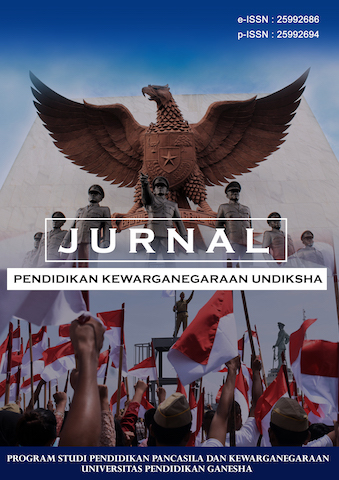OPTIMALISASI PERAN PEMBIMBING KEMASYARAKATAN DALAM PROSES DIVERSI PADA TINGKAT PENYIDIKAN KASUS ANAK YANG BERKONFLIK DENGAN HUKUM
Keywords:
Community Counselor, Diversion, Children in Conflict with the LawAbstract
Children who commit crimes are referred to as children in conflict with the law (ABH). A child will also undergo criminal justice processes. However, giving punishment to children through formal justice channels is considered to worsen the development of children's lives. Diversion is an alternative method of punishing children. Community mentors have the main duties and functions of guiding ABH and facilitating the diversion process. Community mentors have a strategic role in stimulating the implementation of diversion. Community advisors will collaborate with law enforcement agencies to carry out diversion. As a facilitator, mentor and companion for a child who conflicts with the law. Community counselors certainly have an important role in the success of the diversion process of children in conflict with the law.
References
Buku
Bryman, A. (2012). Social Research Methods. Oxford University Press
Frajic S. (2020). Why Youth People Commit Criminal Acts. SunText Review of Neuroscience & Psychology, 01(01). https://doi.org/10.51737/2766- 4503.2020.003
Hengki Wijaya. (2019). Analisis Data Kualitatif: Sebuah Tinjauan Teori dan Praktik.
Rashdall, H. (1891). The Theory of Punishment. In International Journal of Ethics
(Vol. 2, Issue 1).
Karim, E. (2020). The Critical Evaluation of the Different Theories of Punishment Philosophy of Mind View project Ethics View project. https://www.researchgate.net/publication/350134502
Artikel
Dyah Listyarini, D. (2017). Juvenile Justice System Through Diversion And Restorative Justice Policy Diponegoro Law Review (Vol. 02).
Khatimah Husnul, M. A. T. C. E. (2022). Peran Komunikasi Bagi Pembimbing Kemasyarakatan dalam Keberhasilan Diversi Pada Anak. Jurnal Pendidikan Dan Konseling, 4(6), 3586–3590.
Khuda, K. E. (2019). Juvenile Delinquency, Its Causes and Justice System in Bangladesh: A Critical Analysis. Journal of South Asian Studies, 7(3), 111–120. https://doi.org/10.33687/jsas.007.03.3097
Nugroho, T. A. (2019). Analisa Kebutuhan Pembimbing Kemasyarakatan Balai Pemasyarakatan (BAPAS) Bandung. Jurnal Ilmiah Kebijakan Hukum, 13(1), 69.
Nurhaliza, R., Liyus, H., & Wahyudi, D. (n.d.). Pelaksanaan Kesepakatan Diversi Pada Tingkat Penyidikan Dalam Sistem Peradilan Anak. In PAMPAS: Journal Of Criminal Law (Vol. 1, Issue 1). https://www.mahkamahagung.go.id/id/artikel/
Pribadi Bagas. (2022). Keadilan Restoratif Dalam Penerapan Diversi Terhadap Pelaku Klitih di D.I.Yogyakarta. Jurnal Crepido, 04(02), 83–94.
Sinatrio, W. (2019). The Implementation of Diversion and Restorative Justice in the Juvenile Criminal Justice System in Indonesia. Journal of Indonesian Legal Studies, 4(1), 73–88. https://doi.org/10.15294/jils.v4i01.23339
Suherlan, D., Pemasyarakatan, B., & Tangerang, K. I. (2022). Peran Pembimbing Kemasyarakatan Sebagai Mediator Dalam Proses Diversi Anak Yang Berhadapan Dengan Hukum. In Jurnal Pendidikan Kewarganegaraan Undiksha (Vol. 10, Issue 1). https://ejournal.undiksha.ac.id/index.php/JJPP
Supriadi, A. (2019). Program Pembimbingan Bagi Warga Binaan Pembebasan Bersyarat (Studi Kasus Pada Bapas Kelas 1 Jakarta Selatan).
Perundang-Undangan
Undang-Undang Perlindungan Anak No. 23 Tahun 2002 Undang-Undang No. 12 tahun 2022 tentang Pemasyarakatan
Undang-Undang No.11 Tahun 2012 tentang Sistem Peradilan Pidana Anak.
Downloads
Published
Issue
Section
License

This work is licensed under a Creative Commons Attribution-ShareAlike 4.0 International License.
Authors who publish with the Jurnal Pendidikan Kewarganegaraan Undiksha agree to the following terms:
- Authors retain copyright and grant the journal the right of first publication with the work simultaneously licensed under a Creative Commons Attribution License (CC BY-SA 4.0) that allows others to share the work with an acknowledgment of the work's authorship and initial publication in this journal.
- Authors are able to enter into separate, additional contractual arrangements for the non-exclusive distribution of the journal's published version of the work (e.g., post it to an institutional repository or publish it in a book), with an acknowledgment of its initial publication in this journal.
- Authors are permitted and encouraged to post their work online (e.g., in institutional repositories or on their website) prior to and during the submission process, as it can lead to productive exchanges, as well as earlier and greater citation of published work. (See The Effect of Open Access)










